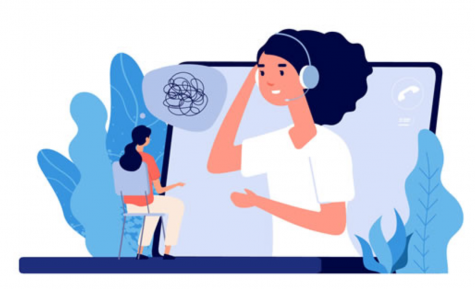
Stress, Isolation, and Online Learning
April 28, 2021

Maintaining good mental health for yourself is extremely important. It is especially critical considering that youth mental health has deteriorated greatly since the COVID-19 pandemic began. In this article, you will read about how isolation and virtual learning have affected mental health, how suicide rates have increased, and how to cope with stress and improve your emotional wellbeing.
 Friends and Family
Friends and Family
About a year ago, students around the world were forced to adjust to a new, virtual, isolated world. This abrupt, unplanned change in lifestyle has taken a toll on the mental health of many students. It has led to feelings of confusion, stress, and disconnection from peers, family, and society as a whole.
Many students regularly turned to friends and family for support prior to the pandemic, but since it began reaching out to loved ones and finding support for one’s mental health have become more difficult than ever. For example, a survey conducted by Youth Mental Health Canada showed that among four hundred students aged 10-20, about 60% said that they had no one to turn to with a mental health problem. This is mainly fueled by kids’ lack of communication with their family and peers.
Online Learning
Virtual school has also had a sizable impact on the mental health of students. For instance, stress and anxiety levels are more likely to rise while learning at home. This is because of factors such as low concentration levels while learning in a home environment, difficulty finding the extra education support needed to succeed, and varying comfort levels while participating in online meetings.
finding the extra education support needed to succeed, and varying comfort levels while participating in online meetings.
In addition, with school being the centre of many teens’ social lives, the drastic decrease in social interactions can also have harmful effects on a student’s emotional wellbeing. Overall, learning, growing, and living during a pandemic have had many effects on the mental health of youth. This leaves some students in desperate need of support as they might not have the resources or the opportunities.
 Suicide Mental Health Concern
Suicide Mental Health Concern
To stop the spread of COVID-19, several countries have introduced new stay-at-home restrictions. But additionally, the suicide rate has risen drastically. Suicide has become an important cause of concern for youth mental health, as it is the second leading cause of death among teenagers.
According to Hamilton’s McMaster Children’s Hospital, the number of young people seeking medical attention after attempting suicide tripled in the last four months compared to the same time frame last year. Between October 1, 2020, and January 31, 2021, 26 youths were admitted for medical treatment and stabilization following a suicide attempt. During the same time period a year ago, only seven young people were hospitalized for medical treatment after attempting suicide.
Many of those who attempted suicide had COVID-related issues, such as a loss of social interaction and increased domestic conflict. The mental health consequences of the COVID-19 epidemic, such as suicidal behaviour, are likely to last a long time and peak much later than the actual pandemic.
How To Cope
Even though it feels like it may be impossible to feel relaxed and secure during this pandemic, there are several ways of coping with the loneliness of quarantine. The first way to help you deal with stress is taking deep breaths. Although it looks useless, it is very effective for your mental health.
for your mental health.
When you take a deep breath, the message of assurance goes through your parasympathetic nerves telling your brain that you are safe. It’s almost like a cheat code to force yourself back into a calm state of mind. Things that happen when you are stressed, like fast heart rate and fast breathing all decrease when you take a deep breath.
Another way of dealing with stress is to consume less news. This eliminates unnecessary stress that won’t be helpful.
Unfortunately, a lot of the news we consume today isn’t so much reporting as it is a way of keeping people addicted to the news cycle
— Logan Jones, PsyD
Having a sense of control in your life can improve your mental health. This can include, keeping a schedule, taking care of something, making something, and helping people.
Talking with your family, friends, and community can let you feel more connected. Even though we have to physically distance ourselves, it doesn’t mean that we also have to be socially distanced. Using social media and facetime apps like Google Meets and Zoom can help you feel connected to those who you care about and can’t meet.
Learn more
Making sure your mental wellbeing is healthy is crucial. During the pandemic youth have been feeling disconnected from the world around them and suicide rates have gone up exceedingly. However, there are ways to cope, such as by being informed and following some of these strategies. For more information, you can go to the following sites.
https://www.ualberta.ca/folio/2020/05/why-covid-19-loneliness-can-be-especially-hard-on-teens.html
and
